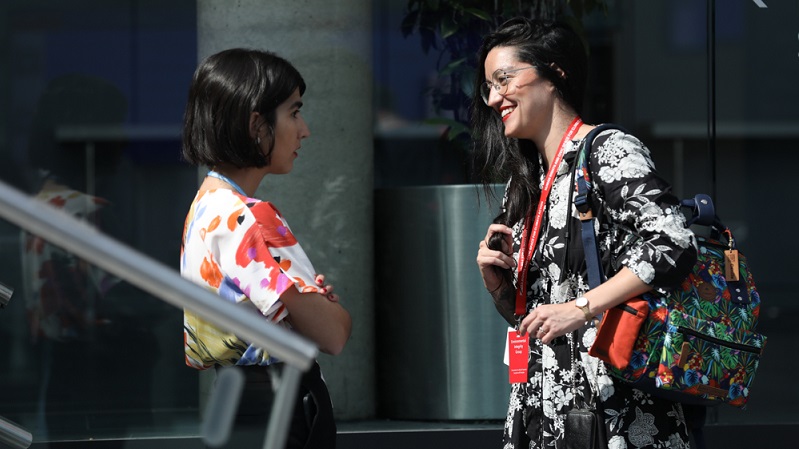At climate talks in Bonn this week, the Mexican delegation led a push for the United Nations (UN) to clamp down on harassment and intimidation at climate talks, winning support and concessions.
The Mexican delegation, which is dominated by young women, spoke up strongly against the “difficult experience” they said they experienced at the Cop27 climate talks in Egypt last November.
Their campaign for reforms gathered momentum throughout the two-week talks in Bonn and resulted in UN Climate Change head Simon Stiell closing the talks by saying that “harassment, be it in the form of sexism, bullying or sexual harassment is not acceptable”.
It also resulted in governments agreeing to make host agreements between the UN and the hosts of the annual Cop talks public, to encourage strong measures to protect delegates.
Battle against powerful men
On Tuesday, the head of Mexico’s delegation Camila Zepeda told a side event in Bonn that her delegation “were among the many that had to suffer quite a difficult experience at Cop27”.
Without going into details, she said “we made official complaints on all these situations that were happening and we were not addressed and we were not taken care of”.
She said that lots of countries which are “usually very vocal about [human rights], here they stand quiet” and “we end up being the only ones left in the room, holding this battle against these very powerful men”.
She later accused the heads of the European Union and US delegations of only supporting her when she went to the press.
When she complained about sexual harassment, Zepeda said that one party had told her there is sexual harassment all over the world.
“Am I going to take for granted that – because I get sexually harassed all over the world – that I get sexually harassed here,” she asked, “it’s just absolutely ridiculous”.
Climate talks have been plagued by sexual harassment since their beginning with Pakistani negotiator Meera Ghani and climate lawyer Farhana Yamin among those speaking out about their harassment.
Intimidation of journalists
The next day, 35-year-old Argentine journalist Tais Gadea Lara complained to the Cop27 presidency about intimidation at the summit in Sharm el-Sheikh.
Sitting around a meeting table in Bonn with other journalists, she told Cop27 ambassador Wael Aboulmagd that the Cop in Egypt was “one of the most difficult Cops to work in”.
UN head Guterres contradicts Cop28 host on fossil fuel phaseout
She told him that whenever she set up her tripod to film reports, four or five men with technical support badges had surrounded her in an attempt to intimidate her. In one case – Gadea Lara said – they turned off the lights when she was recording late at night without many people around.
Aboulmagd said he was “sorry to hear that”, he didn’t know who the men were and the Cop27 presidency had received several complaints and “had reacted”. He told Gadea Lara the best thing was to report in detail what happened to the authorities.
Later, Gadea Lara told Climate Home that a woman from the Egyptian delegation had approached her after she had asked the Cop presidency a question about phasing out fossil fuels. The woman looked at her name badge, wrote on a piece of paper and said thank you, Lara said.
She said she felt “intimidated because she neither introduced herself nor explained why she wanted to write my name down”.
Reforms proposed
Zepeda told the press conference that she had spoken to UN climate change head Simon Stiell about the need to “protect the dignity, privacy and security of all participants”.
A group of at least 20 governments, led by a group of female heads of delegation, joined Zepeda in signing a letter to Stiell, one signatory told Climate Home.
A draft version, seen by Climate Home, urges him to “apply [the UN climate change] code of conduct to any occurrence of unacceptable and/or aggressive behaviour towards women negotiators”.
“We urge you to pay particular attention to the way women negotiators are being treated in UNFCCC’s premises, inside and outside of negotiation rooms, ensuring that all participants feel part of a respectful and safe work environment,” the letter said.
The Overshoot Commission is talking about solar geoengineering. Not everyone thinks it should
On Tuesday afternoon, Swiss negotiator Franz Perez told a meeting “the reports on harassment, bullying and inappropriate behaviour towards delegates at these sessions are concerning”. His comments were echoed by the EU and Australia.
One practical step Zepeda called for was for the agreement between the UN and Cop host to be made public, in order to encourage measures to protect delegates.
She is likely to be successful as a draft document published yesterday proposed that all countries agree that “for transparency”, host country agreements should be made publicly available.
Closing the talks, Stiell said he was aware “that inappropriate behaviour has taken place during this session [in Bonn]”. To applause, he told delegates “the planet is a better place for your presence here and you should not have experienced this in your workplace”.
